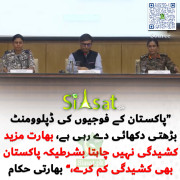Night_Hawk
Siasat.pk - Blogger
[h=1]In a world first, a paralyzed man with severed spinal cord walks again after nerve cell transplant[/h] By Terrence McCoy October 21

This 38-year-old Bulgarian patient, who suffered his injury in 2010, is believed to be the first person in the world to recover from the complete severing of the spinal nerves. (BBC/PA Wire)
In 2010, an assailant attacked Darek Fidyka with a knife, repeatedly stabbing the bald, broad firefighter in the back, and altered his life forever. One of the strikes cleanly sliced through Fidykas mid-spine. Doctors at the time told the Bulgarian there was only a 1 percent chance he would recover. He had lost all motor and sensory control over his legs.
Fidyka went into intensive physiotherapy, but nothing worked. He showed no signs of recovery.
But now, following a surgery scientists hail as a breakthrough and a world first, life has changed for the 38-year-old Fidyka. He can walk with a frame, drive and live with greater independence.
As described by the BBC, which was granted special access to the project and to the rehabilitation over the course of a year, Polish surgeons put into practice a technique developed at University College London. There, research by Geoffrey Raisman revealed damaged nerve cells can form new connections with a little help from special cells in the nasal cavity called olfactory ensheathing cells.
The surgeons took nerve cells from Fidykas nose, used them to culture new ensheathing cells, and transplanted them into the spinal cord stumps above and below his injury. The hope was they would connect and form a bridge or pathway across the gap caused by the injury. And thats exactly what happened.
Within months after the procedure, Fidyka developed feeling in one of his legs and today can move around on his own. In an interview with the BBC, he described it as an incredible feeling. When you cant feel almost half your body, you are helpless, but when it starts coming back its like you were born again.
Scientists were cautious about the promising procedure, stressing only one patient has so far been treated. Determination of the precise mechanisms of action, repetition in more patients and more long-term follow up are all necessary to help validate whether this promising procedure is of clinical relevance, John Sladek of the University of Colorado told the Independent.
Still, if just for Fidyka, the scientists are rejoicing at what the BBC calls a world first in medicine, the full narrative of which is published in the journal Cell Transplantation. Prior to the transplantation, we estimated that without this treatment, our patients recovery chances were less than one percent, Pawel Tabakow of the Wroclaw Medical University said in a statement. However, we observed a gradual recovery of both sensory and motor function that began four months after the surgery.
He can get around with a walker and hes been able to resume much of his original life, including driving a car, Raisman, one of the studys authors, told the Guardian. Hes not dancing, but hes absolutely delighted.
He added to the Independent: I believe this is the first time that a patient has been able to regenerate severed long spinal nerve fibers across an injury and resume movement and feeling. I believe we have now opened the door to a treatment of spinal cord injury which will get patients out of wheelchairs. Our goal is to develop the first procedure to a point where it can be rolled out as a worldwide general approach.
That goal, however, is clearly a long way off. Right now, hes working to raise funds to treat several more patients in Poland in the next five years. Those tests may help show whether this treatment can help an estimated 3 million people paralyzed across the world.
Paralysis is something that most of us dont know very much about, because we are not affected by it, the founder of the Nicholls Spinal Injury Foundation told the Guardian. But the scientific information relating to this significant advancement will be made available to other researchers around the world so that together we can fight to finally find a cure for this condition which robs people of their lives.
http://www.washingtonpost.com/news/...cord-walks-again-after-nerve-cell-transplant/

This 38-year-old Bulgarian patient, who suffered his injury in 2010, is believed to be the first person in the world to recover from the complete severing of the spinal nerves. (BBC/PA Wire)
In 2010, an assailant attacked Darek Fidyka with a knife, repeatedly stabbing the bald, broad firefighter in the back, and altered his life forever. One of the strikes cleanly sliced through Fidykas mid-spine. Doctors at the time told the Bulgarian there was only a 1 percent chance he would recover. He had lost all motor and sensory control over his legs.
Fidyka went into intensive physiotherapy, but nothing worked. He showed no signs of recovery.
But now, following a surgery scientists hail as a breakthrough and a world first, life has changed for the 38-year-old Fidyka. He can walk with a frame, drive and live with greater independence.
As described by the BBC, which was granted special access to the project and to the rehabilitation over the course of a year, Polish surgeons put into practice a technique developed at University College London. There, research by Geoffrey Raisman revealed damaged nerve cells can form new connections with a little help from special cells in the nasal cavity called olfactory ensheathing cells.
The surgeons took nerve cells from Fidykas nose, used them to culture new ensheathing cells, and transplanted them into the spinal cord stumps above and below his injury. The hope was they would connect and form a bridge or pathway across the gap caused by the injury. And thats exactly what happened.
Within months after the procedure, Fidyka developed feeling in one of his legs and today can move around on his own. In an interview with the BBC, he described it as an incredible feeling. When you cant feel almost half your body, you are helpless, but when it starts coming back its like you were born again.
Scientists were cautious about the promising procedure, stressing only one patient has so far been treated. Determination of the precise mechanisms of action, repetition in more patients and more long-term follow up are all necessary to help validate whether this promising procedure is of clinical relevance, John Sladek of the University of Colorado told the Independent.
Still, if just for Fidyka, the scientists are rejoicing at what the BBC calls a world first in medicine, the full narrative of which is published in the journal Cell Transplantation. Prior to the transplantation, we estimated that without this treatment, our patients recovery chances were less than one percent, Pawel Tabakow of the Wroclaw Medical University said in a statement. However, we observed a gradual recovery of both sensory and motor function that began four months after the surgery.
He can get around with a walker and hes been able to resume much of his original life, including driving a car, Raisman, one of the studys authors, told the Guardian. Hes not dancing, but hes absolutely delighted.
He added to the Independent: I believe this is the first time that a patient has been able to regenerate severed long spinal nerve fibers across an injury and resume movement and feeling. I believe we have now opened the door to a treatment of spinal cord injury which will get patients out of wheelchairs. Our goal is to develop the first procedure to a point where it can be rolled out as a worldwide general approach.
That goal, however, is clearly a long way off. Right now, hes working to raise funds to treat several more patients in Poland in the next five years. Those tests may help show whether this treatment can help an estimated 3 million people paralyzed across the world.
Paralysis is something that most of us dont know very much about, because we are not affected by it, the founder of the Nicholls Spinal Injury Foundation told the Guardian. But the scientific information relating to this significant advancement will be made available to other researchers around the world so that together we can fight to finally find a cure for this condition which robs people of their lives.
http://www.washingtonpost.com/news/...cord-walks-again-after-nerve-cell-transplant/






































